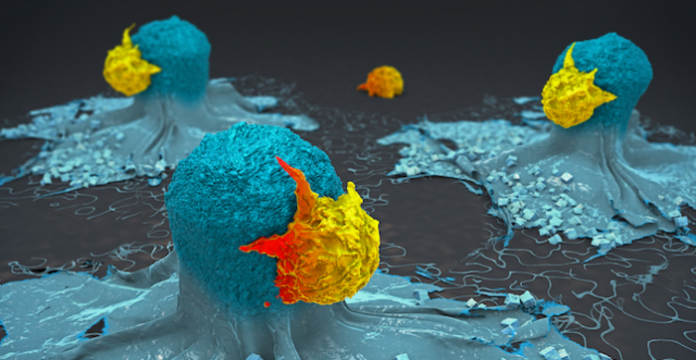
Researchers at the Medical University of Vienna have developed a novel combination immunotherapy that holds significant potential for treating topically accessible cancers like melanoma and breast cancer. By combining systemic administration of the tissue hormone interferon-I (IFN-I) with localized application of the TLR7/8 agonist imiquimod, the treatment not only eliminated tumors at the application site but also induced a robust immune response to combat distant metastases. The findings, published in Nature Cancer, represent a significant step forward in expanding therapeutic options for these challenging cancers.
The therapy leverages the body’s immune system to target and destroy cancer cells. Imiquimod, already used to treat basal cell carcinoma, stimulates plasmacytoid dendritic cells (pDCs) to produce IFN-I, which primes other dendritic cells and macrophages within the tumor environment. These immune cells respond by releasing interleukin-12, a cytokine that inhibits tumor blood vessel formation, leading to cancer cell death. Notably, the combined systemic and localized approach reduced the formation of metastases, prevented relapses, and increased the sensitivity of melanomas to immune checkpoint inhibitors.
“This combination therapy shows great promise in improving outcomes for patients with locally accessible tumors, offering both direct tumor cell death and an enhanced systemic immune response to distant metastases,” said lead researcher Maria Sibilia, PhD, head of the Center for Cancer Research at the Medical University of Vienna.
In preclinical models of melanoma and breast cancer, systemic IFN-I sensitized the immune system to the effects of topical imiquimod, creating a powerful anti-tumor response. The results were reinforced by the inclusion of checkpoint inhibitors, which further boosted the immune system’s ability to target cancer cells. “Topical treatment of the primary tumor is essential for this therapy to clear distant metastases,” noted Philipp Novoszel, a first author of the study.
The study also highlighted the importance of a signaling pathway mediated by c-Jun/AP-1, which upregulates key chemokines like CCL2 and cytokines like interleukin-12 in dendritic cells. This mechanism effectively disrupts vascular endothelial growth factor-A (VEGF-A) production, starving tumors of the blood supply needed to grow and spread.
“By combining systemic IFN-I with topical imiquimod, we’ve developed a strategy that not only eradicates local tumors but also induces a long-lasting CD8+ T cell-mediated immune memory,” explained Martina Sanlorenzo, a co-first author and dermato-oncologist at the Medical University of Vienna.
The translational potential of this combination therapy is supported by clinical data demonstrating that IFN-I enhances TLR7/8 activation in human dendritic cells, mirroring the results observed in preclinical models. With IFN-I already established as a cancer therapy, researchers are optimistic about advancing this approach to clinical trials.
“This innovative strategy offers hope for patients who are not yet responding well to existing immunotherapies,” added Sibilia. “We believe it could significantly improve treatment outcomes for individuals with superficial tumors like melanoma and breast cancer.”





